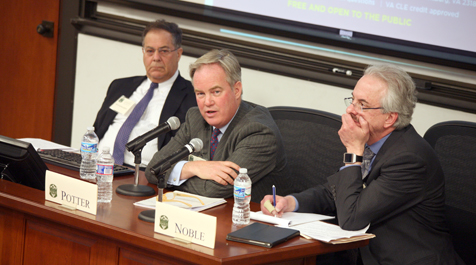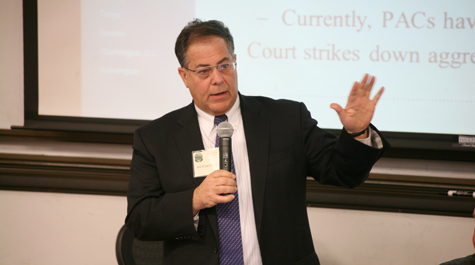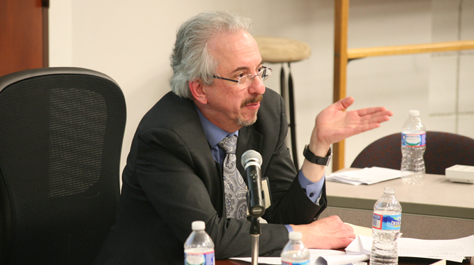Election Law Program Hosts Symposium on Law of Political Giving
On Feb. 27, the William & Mary Law School’s Election Law Program hosted three distinguished practitioners of political and election law for the 2014 Election Law Symposium, entitled “McCutcheon & the World of Political Giving: A Fundamental Change?” In front of students, faculty, and guests, panelists Kenneth Gross, Larry Noble, and Trevor Potter discussed the history and current landscape of the law of political contributions and possible changes to this landscape depending upon the outcome of the current Supreme Court case McCutcheon v. FEC.
McCutcheon centers on the question of the legality of federal limits on aggregate political contributions, that is, whether the federal government may cap the total amount an individual contributes to political candidates and party committees in addition to limiting the amount a single candidate or committee may accept. The Court’s decision could have a major impact on future elections at both the federal and state level.
Potter, founding President of the Campaign Legal Center, leader of Caplin & Drysdale’s political law practice and former Chairman of the Federal Election Commission (FEC), began by describing the historical development of the current campaign contribution scheme. He pointed to the origins of contribution limits in the Buckley case, which came in the wake of the Watergate scandal and the 1972 campaign season. Buckley created the independent FEC to require contribution disclosures and enforce regulations. Potter described McCutcheon as a challenge to the part of Buckley that allowed for limits on individual giving.
Gross, leader of the political law practice at Skadden, Arps, Slate, Meagher & Flom and former associate general counsel of the FEC, next discussed the practical effects that a decision in favor of McCutcheon, the challenger to individual campaign limits, would have on the political landscape. He predicted that the Supreme Court will rule 5-4 to strike down the individual limits.
“Contribution limits can be enforced under the current scheme because there’s a nexus between the [contributing] individual and the candidate and [thus] the risk of corruption,” Gross noted, but nevertheless removing such restrictions will likely have little effect on the federal level. Rather, he argued, a decision in McCutcheon’s favor will have effects in states with aggregate contribution limits for PACs and corporations.
Noble, a national authority on campaign finance and ethics who has practiced political law at Skadden, served as general counsel of the FEC for 20 years, and has argued before the Supreme Court and testified before Congress, concluded with predictions for the future of campaign finance. Even if the Court strikes down individual limits, Congress and state legislatures will have other ways to regulate campaign finance, such as ethics requirements and “pay-to-play” laws.
"Regardless of what happens,” Noble predicted, “we’re going to argue the same thing over and over again.” He encouraged recasting the debate to evaluate whether the current distinction between a “contribution” and an “independent expenditure” still make sense in the current climate of political giving.
About William & Mary Law School
Thomas Jefferson founded William & Mary Law School in 1779 to train leaders for the new nation. Now in its third century, America's oldest law school continues its historic mission of educating citizen lawyers who are prepared both to lead and to serve.


